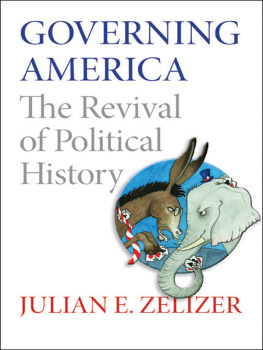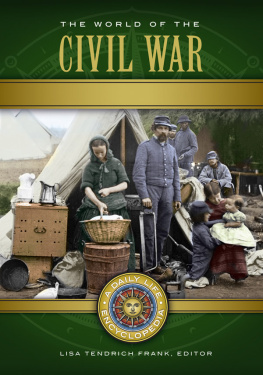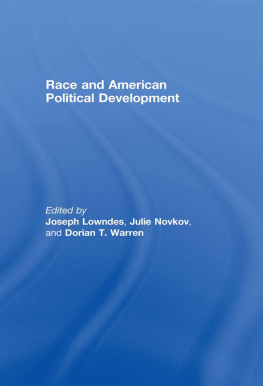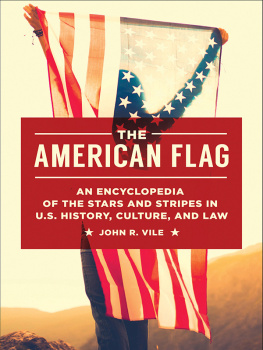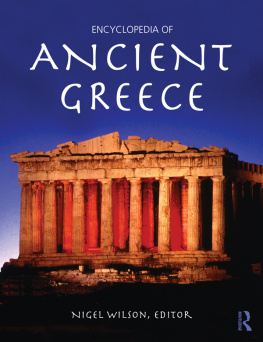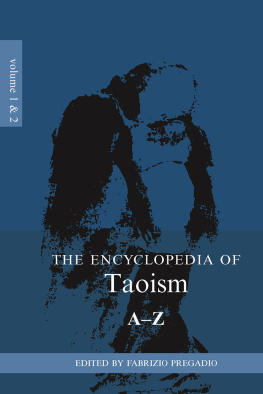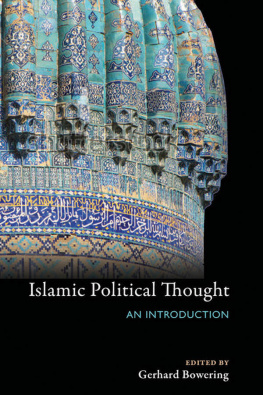The Concise Princeton Encyclopedia ofAmerican Political History

The Concise Princeton Encyclopedia of
American Political History
ADVISORS | EDITOR | ASSOCIATE EDITORS |
Richard R. John | Michael Kazin | Rebecca Edwards |
Ira I. Katznelson | Georgetown University | Vassar College |
Jack N. Rakove | Adam Rothman |
Julian E. Zelizer | Georgetown University |

Copyright 2011 by Princeton University Press
Published by Princeton University Press, 41 William Street,
Princeton, New Jersey 08540
In the United Kingdom: Princeton University Press,
6 Oxford Street, Woodstock, Oxfordshire OX20 1TW
press.princeton.edu
All Rights Reserved
Library of Congress Cataloging-in-Publication Data
The concise Princeton encyclopedia of American political history / advisors Richard R. John... [et al.]; editor Michael Kazin.
p. cm.
Includes bibliographical references and index.
ISBN 978-0-691-15207-3 (pbk.: alk. paper) 1. United StatesPolitics and governmentEncyclopedias. 2. Political scienceUnited StatesHistoryEncyclopedias. I. Kazin, Michael, 1948- II. Title.
E183.C74 2011 |
320.03dc22 | 2011009777 |
British Library Cataloging-in-Publication Data is available
This book has been composed in Adobe Garamond
and Myriad
Printed on acid-free paper.
Printed in the United States of America
10 9 8 7 6 5 4 3 2 1
Contents
Preface
What is political history? The answer may seem obvious. In everyday language, politics in a democratic nation like the United States is the subject of who gets elected to office and what they do with the powers granted to them by voters, laws, and constitutions. It is an endless contest of speech making, lawmaking, fund-raising, and negotiating in which ambitious actors spend their lives struggling to come out on top.
This definition may seem like common sense, but it does not capture what most political historians actually do. Many authors who engage in the serious study of past politics try to understand the larger forces that propel changes in governments, laws, and campaigns. The most influential historians, in particular, have always framed the narrative of legislative give-and-take and winning and losing office within a context of grand historical themes and developments. In the 1890s, Frederick Jackson Turner argued that the frontier experience shaped American democracy. For him, regional identities and cultures drove political development. Early in the twentieth century, Charles and Mary Beard contended that the clash of economic interests was at the root of every turning point in U.S. historyfrom the drafting of the Constitution to the Civil War. At mid-century, Richard Hofstadter used the psychological concept of status anxiety to explain the fervor of both Populist and Progressive reformers. In recent decades, leading scholars have sought to illuminate evolving tensions within the body politic by focusing on intersecting differences of religion and cultural taste, race and ethnicity, gender and class.
The Concise Princeton Encyclopedia of American Political History also assumes an expansive definition of politics: the meaning and uses of power in the public sphere and the competition to gain that power. The word politics derives from the Greek word for citizen, and the rights, powers, and obligations of citizens and their governments have been at the core of the subject since the days of Aristotle, Plato, and Herodotus.
Another tradition has been with us since the building of the Acropolis: history is a constant debate. In this spirit, our contributors offer interpretations of their topics, not merely a factual record or a summary of views held by others. Each article ends with a bibliography meant to guide the reader to some of the most significant works on that topic.
The study of politics in the United States has featured several interpretive approaches since the first serious histories of the subject were published in the middle of the nineteenth century. First, at a time when universities were just beginning to train historians, such self-taught, eloquent writers as George Bancroft and Henry Adams wrote multivolume narratives of presidents and diplomats. Their prose was often vivid, and their judgments had a stern, moralizing flavor.
By the early twentieth century, such grand personal works were being supplanted by a rigorously empirical approach. This was a style of history pioneered by disciples of the German academic scholar Leopold von Ranke, who declared that the past should be studied as it really was. Rankean scholars wrote careful monographs which piled fact upon fact about such subjects as the decisions that led to independence and the making of new state constitutions. They believed a scientific approach could produce a political history with the opinions of the historian left out.
At the same time, however, a new group known as the progressive historians was garnering controversy and a large readership outside academia as well as among scholars. Such leading progressives as Turner, the Beards, and Vernon Parrington described a long-standing division between, on the one hand, the makers of elite, urban culture and big business and, on the other hand, small farmers and self-taught, self-made men from rural areas and the frontier. These historians were sympathetic toward the reform movements of their dayfrom the Populists in the 1890s to the New Dealers of the 1930swhich portrayed themselves as fighting for the people.
By the 1940s, a reaction to the progressive scholars was gathering force. Such historians as David Potter, Daniel Boorstin, and the political scientist Louis Hartz joined Hofstadter in arguing that politics in the United States had long been characterized more by a consensus of values than by a conflict over economic interests. Such counterprogressive scholars argued that most Americans had always embraced liberal capitalism and rejected any politicians and movements that aimed to do more than tinker with the existing system.
This sober, often ironic sensibility was challenged head-on in the late 1960s by historiansmost of them youngwho were inspired by contemporary movements for African American freedom, feminism, and against the war in Vietnam. These New Left scholars revived the progressive emphasis on sharp, ongoing conflict but located its wellsprings among workers, racial and ethnic minorities, and womengroups that had previously received little attention from political historians. Influential scholars like Eric Foner, Gerda Lerner, Nathan Huggins, Eugene Genovese, and Alan Brinkley embedded their narratives of power in a rich context of class relations, racial identities, and cultural assumptions. Arguing that ordinary people were as much agents of change as were national politicians and government officials helped to democratize understanding of the past, even as it deemphasized such durable institutions as the courts, Congress, and the major political parties.
More recently, an increasing number of scholars have turned away from focusing on American politics in isolation from similar developments occurring elsewhere in the world. Their transnational perspective challenges patriotic vanities by chipping away at the notion that the United States ever stood apart from ideas and social movements that shook other lands and peoples. Thomas Bender interprets the Norths victory in the Civil War as producing a newly potent national state much like those emerging at the same time in Japan, Italy, Argentina, and Germany. Similarly, Daniel Rodgers describes how American reformers in the early twentieth century tried to apply policy ideas they had picked up on visits with fellow progressives and moderate socialists in Europe.
Next page

